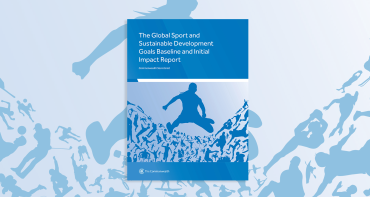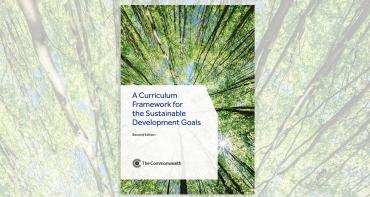Sport, one of the great shared traditions of the Commonwealth, can make a very valuable contribution to shared goals and aspirations of our member countries.

1. What challenges do Commonwealth member countries face in trying to leverage the benefits of sport for development and peace?
Sport, one of the great shared traditions of the Commonwealth, can make a very valuable contribution to shared goals and aspirations of our member countries.
To maximise the benefit, there needs to be deliberate policies and strategies and intentionality for how you use sport. Putting in place these policies at a national level can be a challenge, as is resourcing and implementing these intended strategies. Linked to that is a challenge of how we measure the impact of sport on non-sport outcomes like improving health, education, cohesion and employability.
It is also a challenge for many Commonwealth member countries to develop statistics and evidence contributions that sport makes to sustainable development.
2. How does the work of the Secretariat help in addressing these challenges?
In our work at the Secretariat, we are clear that sport, in itself, is not a panacea for development. There can be very positive outcomes of participation in sports and physical activities. Similarly, sport is also at risk for being a space for discrimination and exclusion, as well as a space where there may be governance and corruption issues.
The Commonwealth’s focus is both on maximising the positive impact of sport, while also developing policies at the national and Pan-Commonwealth level to improve governance, equality and inclusion within sport to enhance the positive impact on communities.
To do this, we undertake wide-ranging consultation and analysis, engaging both internal and external experts, research and data, and produce practical guidance and toolkits for government and non-government actors.
We also provide direct technical assistance and capacity-building to member countries to develop national policies that use sports to contribute to non-sport outcomes.
Oliver expert final
3. The Commonwealth Sports Ministers Meeting was held in April this year. How is the Secretariat helping to transform the commitments made into action?
Three areas for collective action were agreed at the Commonwealth Sports Ministers Meeting in April. These are strengthening capacity to respond to sports integrity threats, developing further consensus on sport and human rights, and strengthening the ability to measure the contribution of sport to sustainable development.
The forthcoming meeting of the Commonwealth Advisory Body on Sport, in September, will primarily focus on developing work plans to take forward these identified areas for action and produce concrete deliverables for the 10th Commonwealth Sports Ministers Meeting in 2020 and the Commonwealth Heads of Government Meeting the same year.
These will be a mapping of different sport integrity capabilities and vulnerabilities across member countries, developing a consensus statement on sport and human rights, and developing model indicators to measure the contribution of sport to the sustainable development goals.
4. How does changing policy help to transform people’s lives on the ground?
Changes in national policy and strategy can transform lives on the ground. For example, we know that physical inactivity is one of the top four risk factors for non-communicable disease (NDC). We are also aware that there is a gender gap in terms of participation in and leadership of sport and physical activity, with women underrepresented.
So, deliberate investment and strategies to get more women and girls participating in sport and involved in leadership, coaching and administrative roles, has a health outcome, in terms of reducing the risk factors for the NCDs, and also helps to challenge stereotypes around gender roles.
Through such policy and programming, you can get broader change around peoples’ lives and we have seen impact in terms of community health and physical activity and in challenging and transforming gender stereotypes.


